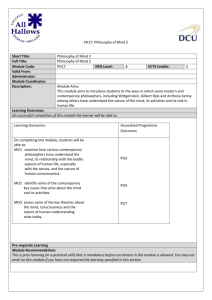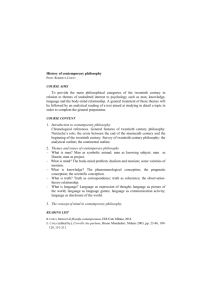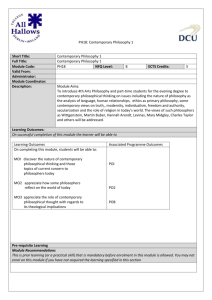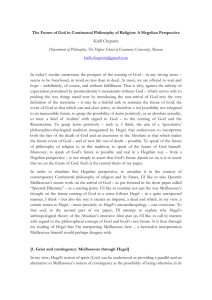Dialectics of Nature: A Reading of Engels` classic against the
advertisement
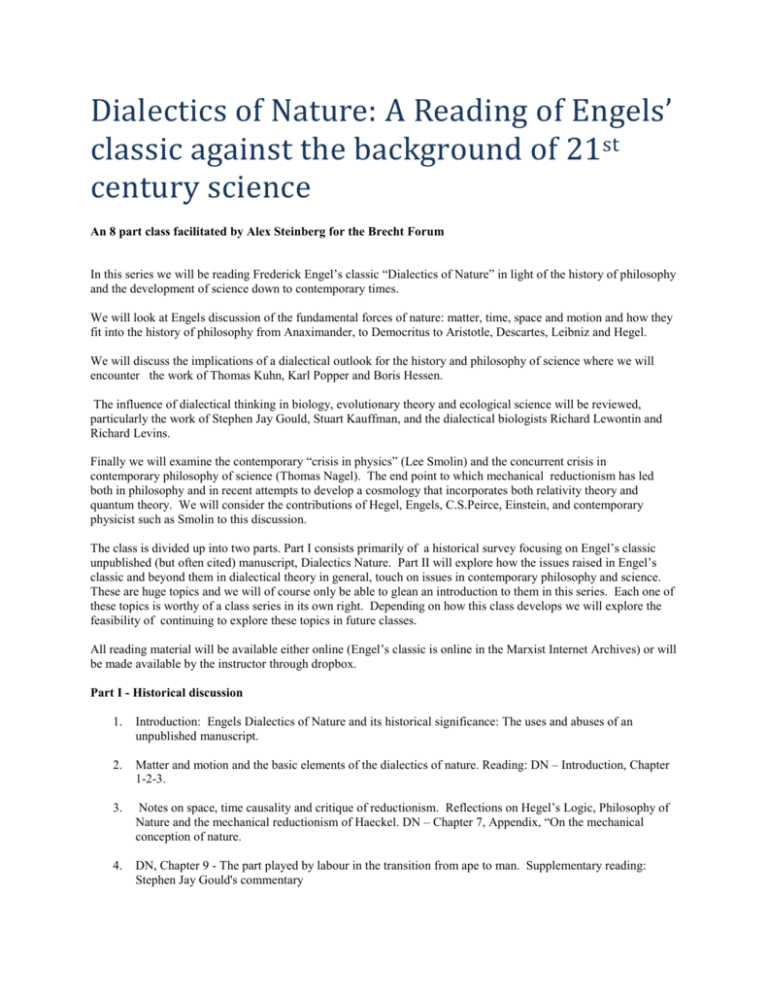
Dialectics of Nature: A Reading of Engels’ classic against the background of 21st century science An 8 part class facilitated by Alex Steinberg for the Brecht Forum In this series we will be reading Frederick Engel’s classic “Dialectics of Nature” in light of the history of philosophy and the development of science down to contemporary times. We will look at Engels discussion of the fundamental forces of nature: matter, time, space and motion and how they fit into the history of philosophy from Anaximander, to Democritus to Aristotle, Descartes, Leibniz and Hegel. We will discuss the implications of a dialectical outlook for the history and philosophy of science where we will encounter the work of Thomas Kuhn, Karl Popper and Boris Hessen. The influence of dialectical thinking in biology, evolutionary theory and ecological science will be reviewed, particularly the work of Stephen Jay Gould, Stuart Kauffman, and the dialectical biologists Richard Lewontin and Richard Levins. Finally we will examine the contemporary “crisis in physics” (Lee Smolin) and the concurrent crisis in contemporary philosophy of science (Thomas Nagel). The end point to which mechanical reductionism has led both in philosophy and in recent attempts to develop a cosmology that incorporates both relativity theory and quantum theory. We will consider the contributions of Hegel, Engels, C.S.Peirce, Einstein, and contemporary physicist such as Smolin to this discussion. The class is divided up into two parts. Part I consists primarily of a historical survey focusing on Engel’s classic unpublished (but often cited) manuscript, Dialectics Nature. Part II will explore how the issues raised in Engel’s classic and beyond them in dialectical theory in general, touch on issues in contemporary philosophy and science. These are huge topics and we will of course only be able to glean an introduction to them in this series. Each one of these topics is worthy of a class series in its own right. Depending on how this class develops we will explore the feasibility of continuing to explore these topics in future classes. All reading material will be available either online (Engel’s classic is online in the Marxist Internet Archives) or will be made available by the instructor through dropbox. Part I - Historical discussion 1. Introduction: Engels Dialectics of Nature and its historical significance: The uses and abuses of an unpublished manuscript. 2. Matter and motion and the basic elements of the dialectics of nature. Reading: DN – Introduction, Chapter 1-2-3. 3. Notes on space, time causality and critique of reductionism. Reflections on Hegel’s Logic, Philosophy of Nature and the mechanical reductionism of Haeckel. DN – Chapter 7, Appendix, “On the mechanical conception of nature. 4. DN, Chapter 9 - The part played by labour in the transition from ape to man. Supplementary reading: Stephen Jay Gould's commentary Part II - Topics in philosophy and science 5. Dialectical Biology vs Reductionism - Gould and Eldredge critique and correction of Darwin and natural selection in their theory of punctuated equlibrium. The return of “catastrophism” to respectable science. Readings - essays by Gould, Dawkins, selection, from Trotsky's Philosophical Notebooks, selections from Darwin's Origin of the Species. 6. Richard Levins and Richard Lewontin on the employment of systems theory, complexity theory and the logic of wholes and parts in contemporary biology. The not so respectable re-emergence of Teleology in contemporary biology and physics. The difference between Teleology as a dialectical category and the “argument from design”. Readings from Hegel’s Encyclopedia Logic, and Philosophy of Nature, Engels, Gramsci, Stuart Kauffman. 7. The crisis in contemporary physics and the scientific-naturalist outlook of contemporary philosophy. Readings: Thomas Nagel, Lee Smolin. 8. The disappearance of time in the Scientific Revolution and its resurrection in post relativity theory. Why is there something rather than nothing? Are the laws of nature “Eternal” or do they evolve? Reading: Hegel, Philosophy of Nature. C.S. Peirce, Lee Smolin, Time Reborn. ************************************************************************************ Biographical Note Alex Steinberg has previously taught courses on Hegel’s Phenomenology, Hegel’s Philosophy of History as well as Hegel’s Logic at the New Space. He is the author of several essays, including "The Case of Martin Heidegger”, http://www.wsws.org/en/articles/2000/04/heid-a05.html, He has been a past presenter at several Left Forums, speaking on such topics as Heidegger and Nazism, Marxism Human Nature and Psychoanalysis, http://forum.permanentrevolution.org/2011/04/left-forum-presentations-marxist-theory.html, and most recently a talk on the topic of “Hegel’s Philosophy of History and its legacy for the Left”, http://forum.permanent-revolution.org/2013/06/left-forum-hegels-philosophy-of-history.html. He has also served as a member of the WBAI Local Station Board and was until this year on the Board of Directors of the Pacifica Foundation, the parent company of WBAI, KPFA in Berkeley, KPFK in Los Angeles, KPFT in Houston and WPFW in D.C. Alex graduated from the New School for Social Research with an M.A. in philosophy. He left academia and his pursuit of a doctorate in 1970 when he joined the student occupation of the New School that was part of the wave of reaction to Nixon’s bombing of Cambodia and the killing of protestors at Kent State. He has been an independent Marxist scholar ever since.
